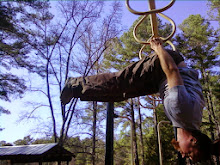
Brought to you by Neil Anderson, broadcaster of CrossFit Radio--
"When I was in school (USU, ex-sci - Class of 98, woot!), we had a cutting edge instructor (Dr. Abendroth-Smith) who had a penchant for destroying myths and fallacies of the exercise world. I learned a lot from her. She had a major impact on my thinking and the way I looked at "generally accepted" training principles and "popular" health instruction. Much of what she taught was contrarian, and poorly accepted by the "scientific community." Things like:
1. Eating low fat (big in the day) was poorly studied and not recommended, by her. She also doubted that eating a high fat diet was contributing to the rising incidence of heart disease and stroke (something still cutting edge to this day).
2. Balancing macro nutrients was better than following the food guide pyramid. She argued that the food guide pyramid was more political than scientific.
3. Hight intensity, short duration exercise was generally better for non-specialists. Can you imagine the words "non-specialists" being used in the late 90's?
4. HR training in the "fat-burning zone" was not recommended, by her, for fat loss.
5. Delayed onset muscle soreness (DOMS) is misunderstood and probably not caused by the popular thinking of the day. Which had more to do with lactate build-up and nerve irritation than anything
These were just a few of the things she would open our minds to in the lectures.
You should have seen the looks she'd get from the Fiteratti as she would teach these principles. CrossFitters know this look. If you have forgotten, simply plink down $5 at your local globo tomorrow and go throw down a Fran. It'll come back to you. I had friends check out of her classes because they thought her teachings were tantamount to heresy. I didn't.
Listening closely to Dr. Abendroth-Smith has served me well over the years. Although I took my lumps and have been kicked out of a couple of places, many of the thoughts on how to improve general health and performance that were considered Law in the late 90's have gone...and those that persist have improved or have been mostly disproved and are only being used by fossils and BS artists of the industry..."


 Have fun. See you in the New Year!!
Have fun. See you in the New Year!!
.jpg)








